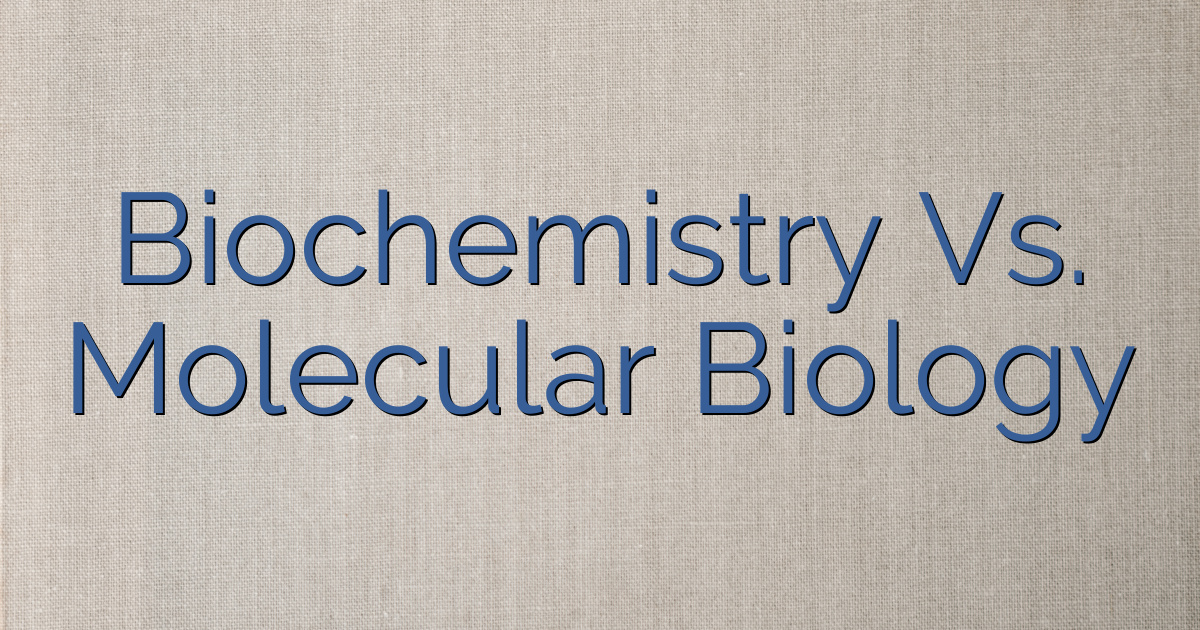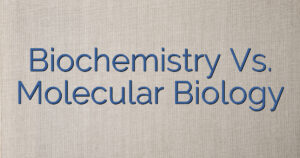 Are you fascinated by the intricate workings of living organisms? Do you yearn to unravel the mysteries of cells and molecules? If so, then you’re in for a treat.
In this article, we will delve into the world of biochemistry and molecular biology, two captivating fields that hold the key to understanding life at its most fundamental level. By comparing their curricula, skills developed, career opportunities, and salary potential, you will gain valuable insights to help you make an informed decision about which path to pursue.
So, let’s embark on this enlightening journey together.
Are you fascinated by the intricate workings of living organisms? Do you yearn to unravel the mysteries of cells and molecules? If so, then you’re in for a treat.
In this article, we will delve into the world of biochemistry and molecular biology, two captivating fields that hold the key to understanding life at its most fundamental level. By comparing their curricula, skills developed, career opportunities, and salary potential, you will gain valuable insights to help you make an informed decision about which path to pursue.
So, let’s embark on this enlightening journey together.
Table of Contents
Key Takeaways
- Biochemistry and molecular biology are both fields that study the structure and function of biological systems, with an emphasis on interdisciplinary collaboration.
- The curriculum in both majors includes a combination of foundational courses and specialized electives, allowing students to tailor their education to their interests and career goals.
- Assessment methods in biochemistry and molecular biology include exams, quizzes, laboratory reports, and research projects, which help develop critical thinking and problem-solving skills.
- Students in both majors acquire analytical and laboratory techniques, such as operating analytical instruments, experimental design, statistical analysis, and following safety protocols, which are essential skills in the fields of biochemistry and molecular biology.
Overview of the two majors: Biochemistry and Molecular Biology
If you’re trying to choose between biochemistry and molecular biology as your major, it’s important to understand the differences between the two. Biochemistry is the study of chemical processes within living organisms, focusing on the structure and function of biomolecules. It involves research opportunities in understanding metabolic pathways, protein structures, and enzyme kinetics. On the other hand, molecular biology primarily investigates the structure and function of genes and how they interact within cells. It explores research opportunities in gene expression, DNA replication, and genetic engineering. Both fields emphasize the importance of interdisciplinary approaches in research. Biochemistry and molecular biology often collaborate with other disciplines such as genetics, cell biology, and biophysics to gain a comprehensive understanding of biological systems. This interdisciplinary approach allows scientists to tackle complex biological questions and make significant advancements in the field.Overview of the curriculum and courses of the two majors
When choosing your major, you’ll find that the curriculum and courses in biochemistry and molecular biology offer unique perspectives on the study of life sciences. Both majors have their own course requirements and elective options that allow you to tailor your education to your specific interests and career goals.| Biochemistry | Molecular Biology |
|---|---|
| Organic Chemistry | Cell Biology |
| Physical Chemistry | Genetics |
| Biochemical Techniques | Molecular Biology Techniques |
| Metabolism and Enzymology | Microbiology |
| Bioinformatics and Biotechnology | Developmental Biology |
Overview of coursework, assessments, and grading methods
In both majors, coursework, assessments, and grading methods are designed to provide a comprehensive understanding of the subject matter and evaluate students’ knowledge and skills. Assessment methods in biochemistry and molecular biology encompass a range of techniques aimed at measuring students’ comprehension and application of theoretical concepts. These methods include exams, quizzes, laboratory reports, and research projects. The grading criteria emphasize accuracy, critical thinking, and problem-solving skills. Practical applications of the knowledge acquired are also assessed through the completion of hands-on experiments and laboratory work. This allows students to apply their theoretical understanding to real-world scenarios and develop practical skills relevant to their field of study. Overall, the assessment methods in both biochemistry and molecular biology majors aim to ensure students are well-prepared for future careers and research opportunities in these fields.Comparison of Skills Developed: Analytical and Laboratory Techniques
The coursework in both majors focuses on developing your analytical and laboratory techniques. You will acquire a set of skills that are essential in the field of biochemistry and molecular biology. Here are four key areas where you will enhance your abilities:- Instrumentation: You will learn how to operate various analytical instruments such as spectrophotometers, chromatographs, and PCR machines. These tools will enable you to analyze biological samples and extract valuable data.
- Experimental Design: You will gain expertise in designing and executing experiments, ensuring accuracy, precision, and reproducibility. This includes selecting appropriate controls, identifying variables, and interpreting results.
- Data Analysis: You will become proficient in statistical analysis, data visualization, and interpretation. This will enable you to draw meaningful conclusions from complex data sets and communicate your findings effectively.
- Safety Protocols: You will develop a strong understanding of laboratory safety protocols, including proper handling of hazardous materials, waste disposal, and personal protective equipment usage.
Comparison of Career Opportunities, Job Roles, and Prospects
To explore career opportunities, job roles, and prospects, you need to consider the skills you acquired in both majors. In biochemistry, you have developed a strong foundation in the study of chemical processes in living organisms, including the analysis of biomolecules and their interactions. This can open up a range of career prospects for you, such as working in pharmaceutical research and development, biotechnology companies, or even in academic research. On the other hand, in molecular biology, your skills in understanding the structure and function of biological macromolecules, as well as gene expression and regulation, can lead to job opportunities in fields like genetic engineering, molecular diagnostics, or bioinformatics. Both majors offer diverse job roles and promising career paths in the ever-evolving fields of biochemistry and molecular biology.Comparison of Salary Potential: Job Market Trends
Consider your salary potential and job market trends when comparing career paths in biochemistry and molecular biology. Both fields have promising job market demand, but the salary growth may vary. In biochemistry, the demand for professionals with expertise in drug discovery, genetic engineering, and biochemical analysis is steadily increasing. As a result, the salary potential in this field is expected to grow significantly. On the other hand, molecular biology is also witnessing a surge in demand, particularly in fields like genomics, biotechnology, and genetic research. However, the salary growth in molecular biology may not be as rapid as in biochemistry. Factors such as location, industry, and level of experience can also influence salary potential in both fields. Therefore, it is essential to carefully evaluate the job market trends and salary growth when deciding between biochemistry and molecular biology as a career path.Similarities between Biochemistry and Molecular Biology curricula
When deciding between the career paths of biochemistry and molecular biology, you’ll notice several similarities in their curricula. Both disciplines share core concepts that form the foundation of their studies. In both biochemistry and molecular biology, you’ll delve into the structure and function of biomolecules such as proteins, nucleic acids, and carbohydrates. Additionally, you’ll explore cellular processes like DNA replication, transcription, and translation. These core concepts are fundamental to understanding the intricate workings of living organisms at the molecular level. Moreover, both biochemistry and molecular biology offer abundant research opportunities. In these fields, you’ll have the chance to contribute to groundbreaking discoveries and advancements in various areas, such as drug development, genetic engineering, and disease mechanisms. Through research projects, internships, and collaborations, you’ll gain hands-on experience in experimental techniques, data analysis, and scientific communication. These research opportunities will not only deepen your understanding of the subject matter but also enhance your critical thinking and problem-solving skills. Overall, the curricula of biochemistry and molecular biology exhibit significant overlap in their core concepts and provide ample research opportunities. Whether you choose to pursue a career in biochemistry or molecular biology, you’ll acquire a strong foundation in the molecular principles that underpin life and have the opportunity to contribute to scientific knowledge through research.What is the difference between biochemistry and molecular biology?
Biochemistry focuses on the chemical processes within and relating to living organisms. Molecular biology, on the other hand, studies the structure and function of biological molecules. While both fields are related, the key distinction lies in the emphasis on chemistry versus biochemistry and molecular structure versus biological function.
Difference between Biochemistry and Molecular Biology curricula
If you’re deciding between the two career paths, you’ll notice distinct differences in the curricula of biochemistry and molecular biology. Here’s a skills comparison and industry demand analysis to help you make an informed decision:- Skills Comparison:
- Biochemistry focuses on the study of chemical processes within living organisms. As a biochemist, you’ll develop skills in analyzing and manipulating biological molecules, understanding enzymatic reactions, and studying metabolic pathways.
- Molecular biology, on the other hand, emphasizes the study of DNA, RNA, and proteins. As a molecular biologist, you’ll develop skills in gene expression analysis, cloning, DNA sequencing, and genetic engineering.
- Industry Demand:
- Biochemists are in high demand in various industries, including pharmaceuticals, biotechnology, and healthcare, as they contribute to drug development, disease research, and clinical diagnostics.
- Molecular biologists are sought after in fields such as genetics, genomics, and biotechnology, where they contribute to genetic research, personalized medicine, and bioproduction.
Factors to consider when choosing between the two majors: interests
Now that you understand the difference between the curricula of biochemistry and molecular biology, let’s discuss the factors you should consider when choosing between these two majors. Your personal preferences and career goals play a significant role in this decision-making process. To help you visualize the comparison, here’s a table highlighting some key factors:| Factors | Biochemistry | Molecular Biology |
|---|---|---|
| Interests | Chemistry, metabolism, protein structures | Genetics, DNA replication, gene expression |
| Career Goals | Pharmaceutical research, biotechnology, medicine | Genetic engineering, genomics, molecular diagnostics |

